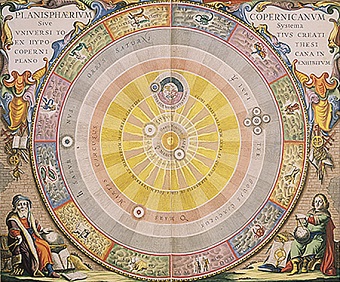SCIENCE & TECHNOLOGY
Martin Luther, Geocentrism, and the Bible vs. Science
By Steve Webb


Single Page/Printer Friendly
Continued from Page One

As centuries passed and scientific observation grew more sophisticated and accurate, it became increasingly clear that the Church's position was wrong, while Galileo and Copernicus were right. Today there are no educated people, Christian or otherwise, who believe that the sun rotates around the earth. We as a church have tacitly, if not openly, admitted that these scriptural passages were merely descriptive of what appeared to the eye; they were not meant to be taken literally, and were not trying to convey any science. The Church was embarrassed and continues to have a black eye on this subject down to present day. Of course, this is past history; there is nothing we can do to change it. But is there anything we can learn from it that can benefit us today?
As Christians, we are aware that God has written two books. The first book is the Bible, which we evangelicals rightly consider to be inerrant. The second book is God's Creation that we can study through the vehicle of science. In fact, God holds us responsible for recognizing Him in nature (Romans 1:20). Now because God is the author of both books they should be in harmony, so what happens when we encounter a situation where one book disagrees with the other? Should we automatically let science trump the Bible when there is a disagreement between them? Heaven forbid! The reason for not allowing this is two-fold. First, there is an interpretive element to science that can sometimes cause science to be in error; i.e. there is such a thing as good science and bad science. Secondly, nature is no longer present in its original created state; it has fallen, as described in Genesis, therefore our study of the book of nature has to be tempered by understanding that it no longer represents God's perfect Creation.
In addition, we need to understand that our interpretation of Scripture has a human element. Scripture may be inerrant but our interpretation of it is not. A great many of our church doctrines are contentious to varying degrees because we bring a human element to the interpretation: our church background, education, intelligence, personality, knowledge of Scripture, cultural background, and other factors unavoidably impact our interpretation of Scripture. So, in the same way that there is good science and bad science, there is also good theology and bad theology. It is a fact of life. Luther and the church back in the Middle Ages were victims of bad theology.
Realizing these factors, how are we to proceed when there is a striking difference between scientific observations and theology? The answer is that we must carefully consider both areas and decide where the problem lies. On the science side, we must listen to the voices that we trust the most — namely scientists who are committed to the inerrancy of the Bible. If we are hearing differences of opinion in that regard we need to carefully listen to both sides. On the theology side, we must listen to theologians we trust the most — and if we are hearing differences of opinion we must similarly listen to both sides. This may be a difficult exercise requiring considerable depth of knowledge, and perhaps the necessity of holding our judgment in abeyance if the answer is not clear.
Today we are faced with a difference between what an overwhelming amount of science says about the age of the earth and what the Bible says about it. Voices like Ken Ham and his ministry, Answers in Genesis, stridently claim that the earth is 6000 years old based on the clear teaching of Scripture. Other Christian ministries like the John Ankerberg ministry, Discovery Institute, godandscience.org, Hugh Ross's books and videos, etc. claim that the earth is much older and that this does not conflict with Scripture. Both sides claim to honor the inerrancy of Scripture. The internet is increasingly populated by chat rooms, websites and Facebook groups that either favor an old earth (OEC = old earth Christians) or favor a young earth (YEC). The one thing we can conclude from this activity is that the debate is not going away. People are fortifying their positions and standing their ground.
This subject matters for basically the same reasons it mattered back in Luther's time. We Christians who represent the corporate church must make sure we are acting wisely or we give the church (and ourselves) a needless loss of credibility. If the Bible clearly teaches a 60000-year earth we need to stand our ground regardless of pressures to do otherwise. We cannot allow science to determine the veracity of the Bible. On the other hand, if the Bible does not clearly indicate a 6000-year earth, and we insist that it does, we place a serious hurdle to faith in front of at least some people, and ultimately the ignominious stain of acting ignorantly, as did the church at the time of Galileo.
As a career geologist, and someone who has been intimately involved in the study of this subject, I can assure you that this is not a simple issue; if you believe it to be simple you have not fully heard both sides. I encourage my fellow believers to "be wise in the way you act towards outsiders, making the most of every opportunity" (Colossians 4:5).
Steven R. Webb
Sept. 11, 2015
Image: Copernicus' heliocentric diagram
Tags: Biblical-Truth | Church-Issues | Controversial-Issues | Science-Creation
comments powered by Disqus
Published 9-14-15

